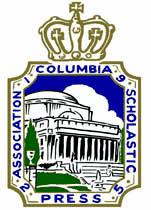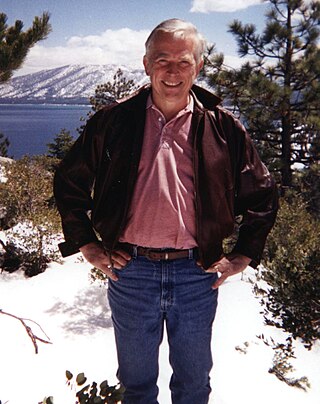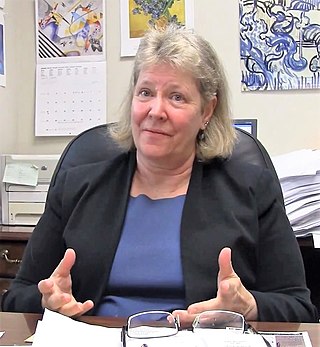The Association for Computing Machinery (ACM) is a US-based international learned society for computing. It was founded in 1947 and is the world's largest scientific and educational computing society. The ACM is a non-profit professional membership group, reporting nearly 110,000 student and professional members as of 2022. Its headquarters are in New York City.

Peer review is the evaluation of work by one or more people with similar competencies as the producers of the work. It functions as a form of self-regulation by qualified members of a profession within the relevant field. Peer review methods are used to maintain quality standards, improve performance, and provide credibility. In academia, scholarly peer review is often used to determine an academic paper's suitability for publication. Peer review can be categorized by the type of activity and by the field or profession in which the activity occurs, e.g., medical peer review. It can also be used as a teaching tool to help students improve writing assignments.
Collaborative writing is a procedure in which two or more persons work together to create a written document or content. This writing tool takes many different forms, including but not limited to academic papers, reports, creative writing, projects, and business proposals. Success in collaborative writing involves a division of labor, unique insights, and most importantly writing techniques. Oftentimes through a shared document, collaborators add edits, provide feedback, and record changes. Collaborative writing is often used in professional as well as educational settings, utilizing the expertise of those involved in the collaboration process.(Storch, 2005)
Electronic publishing includes the digital publication of e-books, digital magazines, and the development of digital libraries and catalogues. It also includes the editing of books, journals, and magazines to be posted on a screen.
Computers and writing is a sub-field of college English studies about how computers and digital technologies affect literacy and the writing process. The range of inquiry in this field is broad including discussions on ethics when using computers in writing programs, how discourse can be produced through technologies, software development, and computer-aided literacy instruction. Some topics include hypertext theory, visual rhetoric, multimedia authoring, distance learning, digital rhetoric, usability studies, the patterns of online communities, how various media change reading and writing practices, textual conventions, and genres. Other topics examine social or critical issues in computer technology and literacy, such as the issues of the "digital divide", equitable access to computer-writing resources, and critical technological literacies. Many study by scientist such have shown that writing on computer is better than writing in a book

Open educational resources (OER) are teaching, learning, and research materials intentionally created and licensed to be free for the end user to own, share, and in most cases, modify. The term "OER" describes publicly accessible materials and resources for any user to use, re-mix, improve, and redistribute under some licenses. These are designed to reduce accessibility barriers by implementing best practices in teaching and to be adapted for local unique contexts.
Peer production is a way of producing goods and services that relies on self-organizing communities of individuals. In such communities, the labor of many people is coordinated towards a shared outcome.

Santa Fe College is a public college based in Gainesville, Florida, with satellite campuses in Alachua and Bradford counties. It is part of the Florida College System. It was established in 1965 as Santa Fe Junior College by the Florida Legislature and began offering classes in September 1966. As of Fall 2020, the school had an enrollment of 12,607 students, and offers associate and baccalaureate degree programs.

Peer-to-peer file sharing is the distribution and sharing of digital media using peer-to-peer (P2P) networking technology. P2P file sharing allows users to access media files such as books, music, movies, and games using a P2P software program that searches for other connected computers on a P2P network to locate the desired content. The nodes (peers) of such networks are end-user computers and distribution servers.

The Columbia Scholastic Press Association (CSPA) is an international student press association, founded in 1925, whose goal is to unite student journalists and faculty advisers at schools and colleges through educational conferences, idea exchanges, textbooks, critiques and award programs. CSPA is a program of Columbia University's School of Professional Studies.
An open textbook is a textbook licensed under an open license, and made available online to be freely used by students, teachers and members of the public. Many open textbooks are distributed in either print, e-book, or audio formats that may be downloaded or purchased at little or no cost.

Dennis Perry Tarnow is an American dentist specializing in periodontics, prosthodontics and implant dentistry and is renown for his mark on dental implant research and education. He is currently director of implant dentistry at Columbia University College of Dental Medicine and former chairman of the department of periodontics and implant dentistry at New York University College of Dentistry. He is a sought after speaker on the subject of implant dentistry.

Roland "Ron" Edwin Larson is a professor of mathematics at Penn State Erie, The Behrend College, Pennsylvania. He is best known for being the author of a series of widely used mathematics textbooks ranging from middle school through the second year of college.

A Virtual Learning Environment (VLE) is a system specifically designed to facilitate the management of educational courses by teachers for their students. It predominantly relies on computer hardware and software, enabling distance learning. In North America, this concept is commonly denoted as a "Learning Management System" (LMS).
Lyryx Learning (Lyryx) is an educational software company offering open educational resources (OERs) paired with online homework & exams for undergraduate introductory courses in Mathematics & Statistics and Business & Economics.
The Saylor Academy, formerly known as the Saylor Foundation, is a non-profit organization headquartered in Washington, DC. It was established in 1999 by its sole trustee, Michael J. Saylor. Since 2008, the focus of the foundation has been its Free Education Initiative which has led to the creation of 241 courses representing 10 of the highest enrollment majors in the US.
MERLOT is an online repository and international consortium of institutions of higher education, industry partners, professional organizations and individuals. MERLOT partners and members are devoted to identifying, peer reviewing, organizing and making available existing online learning resources in a range of academic disciplines for use by higher education faculty and students.

Kathleen Blake Yancey is the Kellogg W. Hunt Professor of English at Florida State University in the rhetoric and composition program. Her research interests include composition studies, writing knowledge, creative non-fiction, and writing assessment.
Jonathan Alexander is an American rhetorician and memoirist. He is Chancellor's Professor of English, Informatics, Education, and Gender & Sexuality Studies at the University of California, Irvine. His scholarly and creative work is situated at the intersections of digital culture, sexuality, and composition studies. For his work in cultural journalism and memoir, Tom Lutz, founding editor of the Los Angeles Review of Books, has called him "one of our finest essayists."
The WAC Clearinghouse publishes peer-reviewed, open-access journals and books, as well as other professional resources for teachers and instructional materials for students. Writing-across-the-curriculum (WAC) refers to a formal programmatic approach within contemporary secondary and higher education composition studies that promotes the importance of writing in classes outside of composition.








